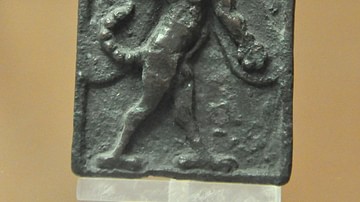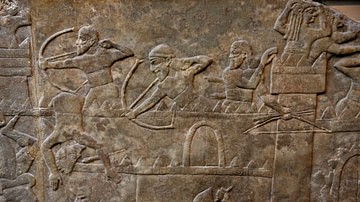Search
Search Results

Article
The Family in Ancient Mesopotamia
Family in ancient Mesopotamia was considered the essential unit that provided social stability in the present, maintained traditions of the past, and ensured the continuance of those traditions, customs, and stability for the future. The...

Article
Festivals in Ancient Mesopotamia - Courting the Goodwill of the Gods
Festivals in ancient Mesopotamia honored the patron deity of a city-state or the primary god of the city that controlled a region or empire. The earliest, the Akitu festival, was first observed in Sumer in the Early Dynastic period (circa...

Article
Ghosts in Ancient Mesopotamia - Just Another Aspect of Life
Ghosts in ancient Mesopotamia were understood as a reality of life, just as they were in other civilizations of antiquity. Although the cultures of the various Mesopotamian civilizations differed between circa 5000 BCE and 651 CE, the belief...

Article
Women in Ancient Mesopotamia
The lives of women in ancient Mesopotamia cannot be characterized as easily as with other civilizations owing to the different cultures over time. Generally speaking, though, Mesopotamian women had significant rights, could own businesses...

Article
Scribes in Ancient Mesopotamia - The Beginning of History
Scribes in ancient Mesopotamia were highly educated individuals trained in writing and reading on diverse subjects. Initially, their purpose was to record financial transactions through trade, but in time, they were integral to every aspect...

Article
Geme-Suen v Ur-Lugal's Wife - A Court Case in Ancient Mesopotamia
During the 21st century BCE, an era known as the Ur III period in Mesopotamia, many records of court hearings were drawn up in Umma, a city in what is now southern Iraq. One court record relates a dispute between two women. The name of one...

Image Gallery
A Gallery of Ziggurats of Ancient Mesopotamia
A ziggurat is an artificial mountain built by the ancient Mesopotamians to elevate the clergy toward the realm of the gods. A form of monumental architecture, the ziggurat had a rectangular base from which a series of steps rose to a flat...

Collection
War, Strategy and Tactics in Ancient Mesopotamia
The ancient Mesopotamians pioneered many strategies, tactics and policies in warfare that would be used for thousands of years to come, some of which continue to this day. The Akkadian Empire was the first to build a standing army and the...

Image
Ancient Mesopotamia from Cities to Empires
The long-term development of Mesopotamia traces one of the earliest and most influential trajectories in world history, spanning from small Stone Age settlements (c. 10,000 BCE) to the political and cultural upheavals of the Late Bronze Age...

Collection
Kingdoms & Empires of Ancient Mesopotamia
The region of ancient Mesopotamia was home to several key kingdoms and empires that left a lasting impact on the region and influenced future civilizations. One of the earliest empires was the Akkadian Empire, established by Sargon the Great...